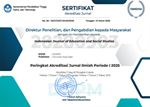Achmad, G. H., Ratnasari, D., Amin, A., Yuliani, E., & Liandara, N. (2022). Penilaian Autentik pada Kurikulum Merdeka Belajar dalam Pembelajaran Pendidikan Agama Islam di Sekolah Dasar. Edukatif : Jurnal Ilmu Pendidikan, 4(4), 5685–5699. https://doi.org/10.31004/edukatif.v4i4.3280
Fahyuni, E. F., Wasis, Bandono, A., & Arifin, M. B. U. B. (2020). Integrating Islamic Values and Science for Millennial Students’ Learning on Using Seamless Mobile Media. Jurnal Pendidikan IPA Indonesia, 9(2), 231–240. https://doi.org/10.15294/jpii.v9i2.23209
Fatima, I., Mohamed Ismail, S. A. M., Pathan, Z. H., & Memon, U. (2020). The Power of Openness to Experience, Extraversion, L2 Self-Confidence, Classroom Environment in Predicting L2 Willingness to Communicate. International Journal of Instruction, 13(3), 909–924. https://doi.org/10.29333/iji.2020.13360a
Fauzi, A., Rosidah, & Akbar, M. (2023). Strategi Pengembangan Keagamaan Siswa SMP Plus. JoIEM, 4(1), 68–83. https://doi.org/10.30762/joiem.v4i1.947
Hanum, A., & Annas, A. (2019). Penggunaan Kurikulum serta Penanaman Nilai dan Spiritual Siswa. Indonesian Journal of Learning Education and Counseling, 1(2), 160–168. https://doi.org/10.31960/ijolec.v1i2.84
Huda, M. (2017). Kompetensi Kepribadian Guru dan Motivasi Belajar Siswa (Studi Korelasi pada Mata Pelajaran PAI). Jurnal Penelitian, 11(2), 237–266. https://doi.org/10.21043/jupe.v11i2.3170
Jafri. (2021). Upaya Guru Pendidikan Agama Islam dalam Meningkatkan Pemahaman Keagamaan Siswa. Al-Liqo’, 6(1), 10–33. https://doi.org/10.46963/alliqo.v6i1.331
Juniar, D. T., Rohyana, A., & Rahmat, A. A. (2019). Pengembangan Model Pembelajaran Diskusi Kelompok dalam Meningkatkan Pemahaman dan Aktivitas Belajar Mahasiswa. JUARA: Jurnal Olahraga, 4(1). https://doi.org/10.33222/juara.v4i1.381
Lase, F. (2018). Dasar Pengembangan Kurikulum menjadi Pengalaman Belajar. Jurnal PG-PAUD STKIP Pahlawan Tuanku Tambusai, 1(2), 130–140.
Marisa, M. (2021). Curriculum Innovation “Independent Learning” in the Era of Society 5.0. Santhet: Jurnal Sejarah, Pendidikan Dan Humaniora, 5(1), 66–78. https://doi.org/10.36526/js.v3i2.e-ISSN
Muljawan, A., & Ibad, S. (2020). Pengembangan Karakter Spiritual Keagamaan Siswa dalam Perspektif Islam. Jurnal Asy-Syukriyyah, 21(1), 49–60. https://doi.org/10.36769/asy.v21i1.98
Niqresh, M. (2019). Digital Library and Intellectual Issues-Issues in Copyright and Intellectual Property. International Education Studies, 12(1), 114–127. https://doi.org/10.5539/ies.v12n1p114
Oktapiani, M. (2020). Tingkat Kecerdasan Spiritual dan Kemampuan Menghafal Al-Qur’An. Tadzhib Al-Akhlak, 1(1), 95–108. https://doi.org/10.34005/tahdzib.v3i1.861
Perrotta, K., & Bohan, C. H. (2019). A Reflective Study of Online Faculty Teaching Experiences in Higher Education. Journal of Effective Teaching in Higher Education, 3(1), 50–66. https://doi.org/10.36021/jethe.v3i1.9
Pratama, S., Siraj, A., & T, M. Y. (2019). Pengaruh Budaya Religius dan Self Regulated terhadap Perilaku Keagamaan Siswa. Edukasi Islami Jurnal Pendidikan Islam, 08(02), 331–346.
Qolbiyah, A. (2022). Implementasi Kurikulum Merdeka dalam Pembelajaran Pendidikan Agama Islam. Jurnal Penelitian Ilmu Pendidikan Indonesia, 1(1), 44–48. https://doi.org/10.56114/edu.v1i2.391
Rahmadayanti, D., & Hartoyo, A. (2022). Potret Kurikulum Merdeka, Wujud Merdeka Belajar di Sekolah Dasar. Jurnal Basicedu, 6(4), 7174–7187. https://doi.org/10.31004/basicedu.v6i4.3431
Raja, R., & Nagasubramani, P. C. (2018). Impact of Modern Technology in Education. Journal of Applied and Advanced Research, 3(1), 33–35. https://doi.org/10.21839/jaar.2018.v3iS1.165
Rifa’i, A., Asih, N. E. K., & Fatmawati, D. (2022). Penerapan Kurikulum Merdeka pada Pembelajaran PAI di Sekolah. Jurnal Syntax Admiration, 3(8), 1006–1013. https://doi.org/10.46799/jsa.v3i8.471
Silva, H., Dominguez, C., Lopes, J., & Morais, E. (2022). Lecture , Cooperative Learning and Concept Mapping : Any Differences on Critical and Creative Thinking Development ? International Journal of Instruction, 15(1), 765–780. https://doi.org/10.29333/iji.2022.15144a
Siregar, F. R. (2017). Nilai-Nilai Budaya Sekolah dalam Pembinaan Aktivitas Keagamaan Siswa SD IT Bunayya Padangsidimpuan. Jurnal Pusat Studi Gender Dan Anak, 1(1), 1–11. https://doi.org/10.24952/gender.v1i1.777
Stranovská, E., Ficzere, A., Hvozdíková, S., & Hockicková, B. (2019). Learning Experience as a Factor of Motivation in Lower-Secondary School in Foreign Language Learning. Problems of Education in the 21st Century, 77(3), 437–448. https://doi.org/10.33225/PEC/19.77.437
Sulaiman, S., & Neviyarni, S. (2021). Teori Belajar Menurut Aliran Psikologi Humanistik serta Implikasinya dalam Proses Belajar dan Pembelajaran. Jurnal Sikola: Jurnal Kajian Pendidikan dan Pembelajaran, 2(3), 220–234. https://doi.org/10.24036/sikola.v2i3.118
Susilowati, E. (2022). Implementasi Kurikulum Merdeka Belajar dalam Pembentukan Karakter Siswa pada Mata Pelajaran Pendidikan Agama Islam. Al-Miskawaih, I(1), 115–132. https://doi.org/10.56436/mijose.v1i1.85
 (Ministry of Religion, Probolinggo Regency)
(Ministry of Religion, Probolinggo Regency) 



